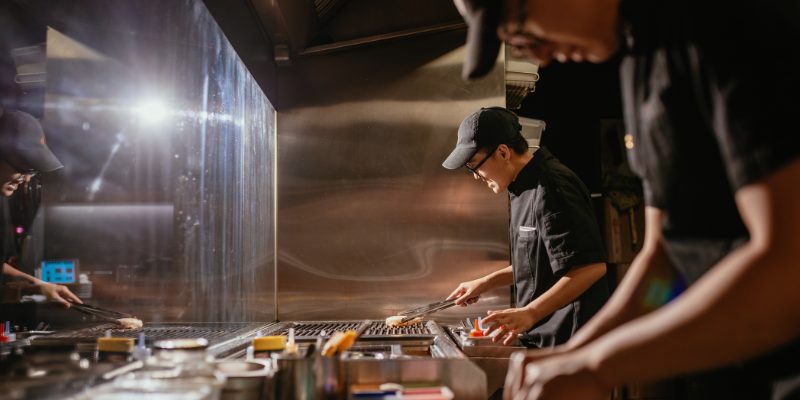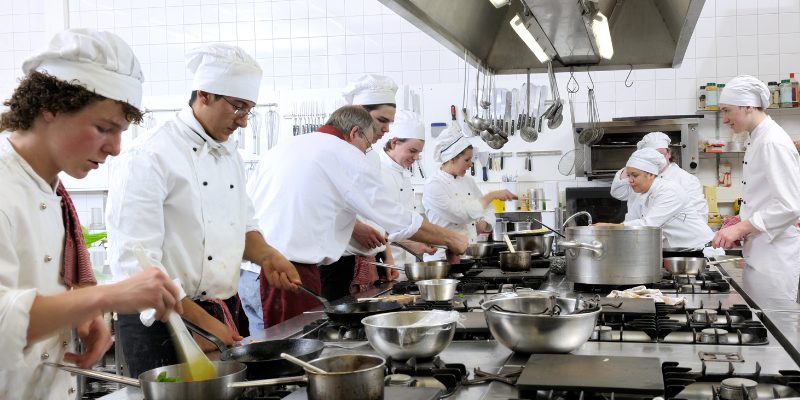Table of Contents
ToggleAre you a restaurant owner in Dade County struggling to find affordable Miami restaurant supplies?
Look no further! This blog post will discuss strategies to help you solve high costs and find affordable Miami restaurant suppliers that meet your quality standards and help your bottom line.
Whether you’re looking for kitchen equipment, restaurant dinnerware, or drinkware, we’ve got you covered.
According to a report by the National Restaurant Association, in 2020 the industry employed over 10% of the total U.S. workforce and generated $899 billion in sales. With such a significant impact on the economy, finding affordable Miami restaurant supplies could also have positive effects on local job growth and economic stability.

Understanding the Miami Restaurant Supply Landscape
Miami’s culinary diversity isn’t just limited to its restaurants and food offerings; it extends deeply into its supply chain, offering a wealth of options for restaurateurs keen on quality and affordability.
The city’s strategic location as a gateway to Latin America and the Caribbean means it’s well-positioned to offer an eclectic mix of ingredients and restaurant equipment that can cater to any cuisine or dining concept.
From specialty food distributors that import unique Latin American ingredients to local manufacturers of high-grade kitchen equipment, the landscape is rich and varied.
Navigating this terrain requires a bit of savvy.
Many suppliers specialize in specific types of products or services, from fresh seafood markets offering the day’s catch to wholesale distributors focusing on bulk kitchen essentials.
Moreover, Miami’s status as an international trade hub means that new products and suppliers are constantly entering the market, providing an ever-evolving palette of options for the discerning restaurateur.
To make the most of what Miami’s restaurant supply landscape has to offer, it’s essential to stay informed about market trends and emerging suppliers.
This might involve attending trade shows, joining industry groups, or simply networking with fellow restaurant owners.
Equally important is understanding the logistics of supply in a bustling city; factors like delivery schedules, minimum order quantities, and storage capabilities can all impact your ability to source effectively.
In essence, the affordable Miami restaurant supplies landscape is as vibrant and dynamic as the city itself.
Embracing its complexity enables restaurant owners to source more effectively and enrich the dining experiences they offer, reflecting the rich tapestry of cultures and cuisines that Miami embodies.
Tips for Finding Reliable Suppliers in Miami
Securing dependable suppliers is crucial for maintaining the flow and quality of your restaurant’s operations.
In Miami, where the supply chain is as diverse as its culinary scene, pinpointing suppliers who can consistently meet your needs requires diligence.
Begin by soliciting recommendations from industry peers, as their experiences can offer invaluable insights into who the most reliable suppliers are.
Diving into online forums and review sites dedicated to restaurant supply can further refine your search, offering a broader perspective on supplier reputations.
Embarking on-site visits to supplier facilities provides a firsthand look at their operations, product quality, and storage conditions, which are critical components in assessing their reliability and fit for your restaurant.
These visits can also offer an opportunity to meet the team behind the supplies, adding a personal dimension to your business relationship that can be beneficial in long negotiations and ensuring priority service.
Engaging in detailed discussions about product specifications, delivery timelines, and contingency plans for supply disruptions with potential suppliers is essential.
These conversations can reveal a supplier’s capacity to meet your demands and adapt to unforeseen challenges, which is vital in a dynamic culinary market like Miami’s.
Finally, fostering strong, ongoing relationships with your chosen suppliers by communicating openly, paying promptly, and providing feedback can lead to advantageous terms and a partnership that contributes to the sustainability and success of your restaurant.
Remember, a reliable supplier is an integral part of your restaurant’s ecosystem, influencing everything from menu quality to customer satisfaction.

Strategies to Reduce Costs Without Sacrificing Quality
Reducing costs while maintaining quality is a delicate balancing act for any restaurant owner. One effective strategy is leveraging the power of bulk purchases.
By ordering larger quantities of essential supplies, you can often secure significant discounts. This approach requires careful inventory management to avoid wastage but can lead to considerable savings in the long run.
Another cost-saving measure is to explore the landscape of alternative suppliers.
Sometimes, less-known suppliers offer competitive prices for the same quality of products, if not better.
This could involve sourcing from local farms for fresh produce or considering generic brands for certain kitchen essentials.
It’s crucial, however, to vet these new suppliers thoroughly to ensure they meet your quality standards.
Negotiating with your current suppliers is also a strategic move.
Many suppliers are willing to discuss prices, especially if you have a longstanding relationship or are willing to commit to a long-term contract.
It’s beneficial to come prepared with market research and competitor prices as leverage during negotiations.
Engaging in a cost-benefit analysis of your current supplies can uncover surprising opportunities for savings.
For instance, slightly adjusting ingredient specifications without compromising the dining experience can reduce costs.
Similarly, reviewing the utility and necessity of certain kitchen equipment or exploring energy-efficient alternatives can offer long-term savings.
Each of these strategies requires a proactive approach and a willingness to adapt and innovate.
By continuously seeking and evaluating cost-reduction opportunities, restaurant owners can safeguard their margins without diminishing the quality of their offerings.
Leveraging Restaurant Technology for Efficient Supply Management
Embracing the digital revolution can transform the way restaurant owners in Miami manage their supply chain.
Implementing state-of-the-art inventory management software becomes a cornerstone for precision in tracking stock levels, expiration dates, and consumption patterns.
This digital tool not only optimizes ordering schedules to prevent both overstocking and stockouts but also ensures that the freshest ingredients are always available for your culinary creations.
Online ordering platforms streamline the procurement process, enabling restaurant owners to place orders at their convenience without being constrained by suppliers’ business hours.
This flexibility is crucial in the fast-paced restaurant industry, where time is of the essence.
Additionally, automated reorder systems can revolutionize supply management by setting predefined thresholds for when orders should be automatically placed.
This innovation is particularly effective in maintaining a consistent stock of essential items, thereby minimizing the risk of running into unexpected shortages.
The integration of these technological solutions offers a comprehensive overview of the restaurant’s supply needs, highlighting areas for cost savings through better deals or identifying trends that could inform future purchasing decisions.
Moreover, the data collected through these platforms can provide invaluable insights into customer preferences and seasonal demand fluctuations, enabling more informed menu planning and inventory control.
Incorporating technology into supply management not only enhances operational efficiency but also positions restaurants to better negotiate with suppliers, armed with precise data on usage and needs.
This strategic approach to supply management through technology ensures that Miami restaurant owners can maintain a competitive edge, optimize their operations, and focus on delivering exceptional dining experiences.
The Role of Local Partnerships in Securing Affordable Supplies
Forging alliances with local restaurant suppliers in Miami presents an unparalleled opportunity for
Miami restaurant owners access a trove of benefits, directly impacting the affordability and uniqueness of their restaurant supplies.
The essence of cultivating these local partnerships lies in the mutual benefits they offer.
By sourcing ingredients and supplies from local vendors, restaurants can take advantage of fresher produce and specialty products that may not be available through larger, national suppliers.
This proximity to the source not only ensures peak freshness but often comes with more attractive pricing due to the reduced transportation and logistics costs.
Engagement with the local economy extends beyond mere transactions; it fosters a symbiotic relationship that enhances the economic fabric of the community.
Restaurants become advocates for local farmers and producers, often leading to collaborations that can introduce diners to new and exciting local flavors, thereby elevating the dining experience and setting the establishment apart from competitors.
Moreover, these partnerships can offer more flexibility in supply quantities and delivery schedules, accommodating the ebb and flow of restaurant demands more readily than larger suppliers might.
The direct line of communication with local suppliers also allows for a greater degree of customization in orders, enabling restaurants to adjust quickly to menu changes or customer feedback without being hamstrung by pre-set orders or minimum requirements.
In an era where consumers increasingly value local and sustainable practices, these partnerships not only contribute to cost efficiencies but also align with growing customer preferences, enhancing the restaurant’s reputation and appeal.
Through these local connections, restaurants can weave a narrative of community support and sustainability into their brand story, appealing to a broad spectrum of patrons looking for a dining experience that supports local businesses and minimizes environmental impact.

Exploring Sustainable and Eco-Friendly Supply Options
In the rapidly evolving restaurant industry, a significant shift toward sustainability and eco-conscious practices has become evident.
Embracing sustainable and eco-friendly options not only mitigates the environmental footprint of a restaurant but also caters to a growing demographic of customers prioritizing green practices in their dining choices.
One practical approach to this is through the adoption of sustainable packaging solutions.
Innovations in biodegradable packaging options have made it easier than ever for restaurants to reduce plastic waste without compromising on functionality or aesthetic appeal.
Further enhancing the eco-friendly ethos of a restaurant involves a commitment to sourcing locally.
This not only supports the local economy but also reduces the carbon emissions associated with long-distance food transportation.
The incorporation of locally sourced ingredients into the menu not only showcases a commitment to sustainability but also ensures that dishes feature the freshest and most flavorful ingredients available.
Another area where Miami restaurants can make a significant impact is through the investment in energy-efficient kitchen equipment.
Modern advancements offer options that significantly reduce energy consumption without sacrificing performance.
This not only leads to lower utility bills but also contributes to a reduced carbon footprint, aligning operational practices with environmental stewardship.
By integrating these sustainable and eco-friendly supply options, restaurants not only demonstrate leadership in environmental responsibility but also enhance their appeal to a market that values sustainability as a key decision-making factor.
Navigating Seasonal Fluctuations in Supply Costs
Navigating the inevitable seasonal fluctuations in supply costs is a vital strategy for maintaining the health of your restaurant’s finances.
One proactive approach to mitigate these fluctuations is by bulk purchasing non-perishable items during their off-peak prices.
This method locks in lower costs and secures a steady supply. Adapting your menu to incorporate seasonal ingredients is another savvy tactic.
This not only aligns with eco-friendly practices but also capitalizes on the lower prices and higher quality of in-season produce.
Establishing a strong rapport with restaurant equipment suppliers is essential, as this relationship can yield insights into upcoming price trends, allowing for strategic purchasing decisions before cost hikes.
Embracing flexibility in menu planning and procurement strategies enables a more responsive approach to the dynamic pricing landscape, ensuring that the restaurant can adapt without compromising on quality or customer satisfaction.
Through these methods, the impact of seasonal cost variations can be efficiently managed, safeguarding your restaurant’s profitability and operational stability throughout the year.
The Benefits of Joining a Miami Restaurant Association
Membership in a Miami restaurant association opens a gateway to a plethora of resources tailored to the unique challenges and opportunities within the local culinary landscape.
Such organizations are not merely platforms for networking but act as vital conduits for shared knowledge, collective bargaining, and advocacy on issues critical to the hospitality industry.
The strength of these associations lies in their ability to bring together diverse voices from the restaurant community, fostering a sense of unity and shared purpose.
One of the most immediate benefits members can experience is access to negotiated discounts with suppliers of Miami restaurant supplies.
These discounts, often not available to individual establishments, can significantly reduce the overhead costs associated with running a restaurant.
Additionally, associations frequently organize events and workshops focusing on industry best practices, emerging trends, and operational efficiencies, equipping members with the knowledge to streamline their businesses and enhance profitability.
Beyond tangible benefits, being part of a restaurant association offers an invaluable support network.
Peer-to-peer interactions provide a forum for sharing experiences, troubleshooting common issues, and discussing strategies to navigate the competitive Miami restaurant scene.
Moreover, associations often have a strong presence in local government, advocating on behalf of their members for favorable regulations and policies.
In essence, the advantages of joining a Miami restaurant association extend far beyond cost savings, embedding members in a community dedicated to elevating the city’s dining experience and ensuring the collective success of its restaurants.

